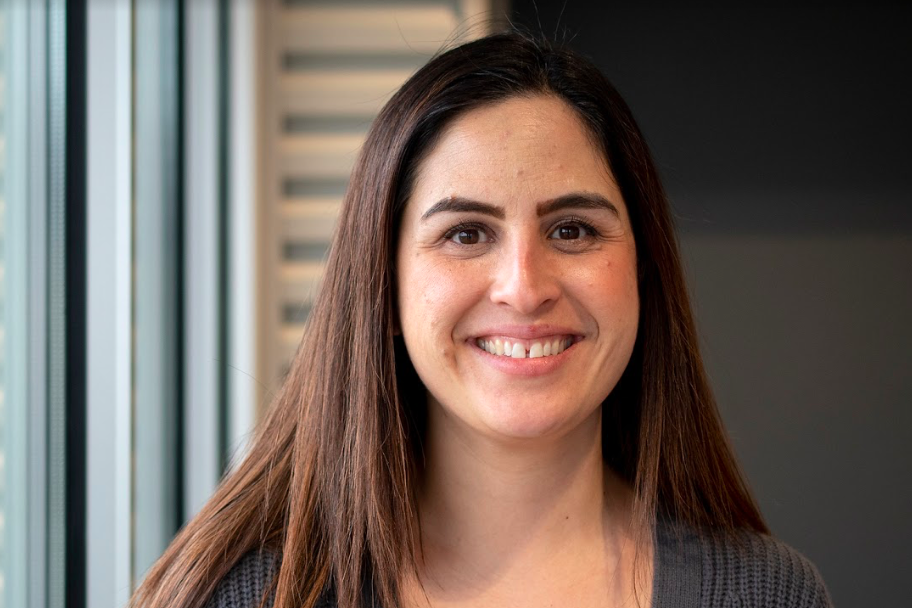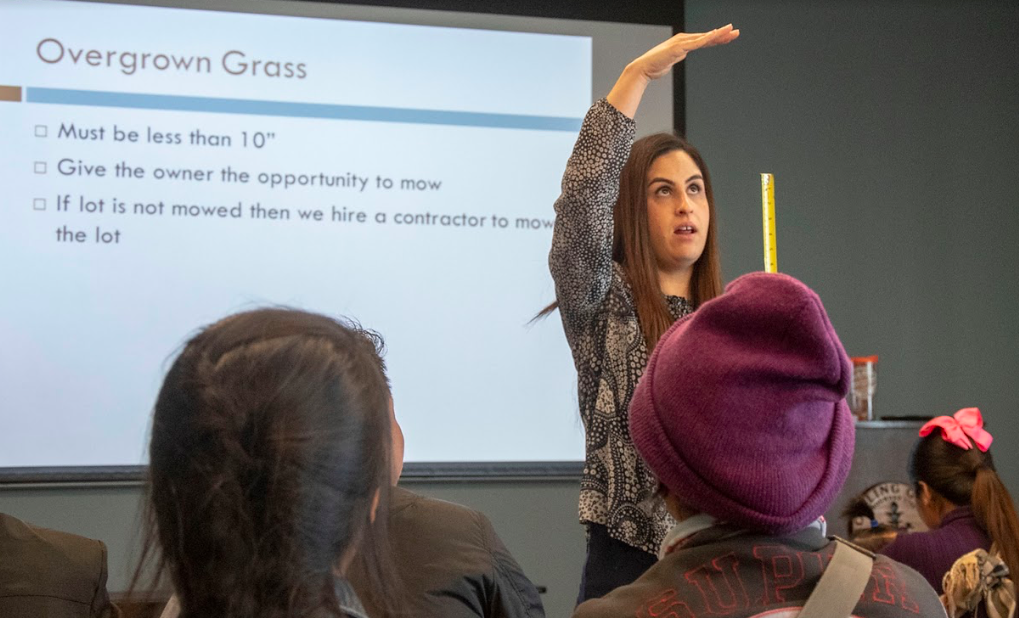Leyda Becker


EL: Leyda Becker, ¿de dónde es Usted?
LB: Yo nací en Venezuela.
LM: ¿Por qué vino a los Estados Unidos?
LB: Cuando yo tenía ocho años, mis papás se separaron. Mi mamá era de Irán, del medio Oriente. Ella nació en los [años] 50, y en los 50 Irán era completamente diferente. [...]Ella vino a estudiar en la universidad, en Western Kentucky, en los 60. Y ya las cosas habían cambiado mucho. Por ejemplo, la influencia de la religión musulmana era muy grande y para una mujer; había muchas restricciones. Entonces mi mamá dijo, “No creo que sería un buen cambio para mis hijos, ir de Venezuela a Irán,” aunque era su país. Ella tenía un hermano aquí en Kentucky, y un hermano y una hermana en California. Ella quería estar más cerca de su propia familia.
EL: Cómo se define su identidad?
LB: Yo crecí en Venezuela, pero mi herencia es de Irán. Pero mi identidad - yo siempre me identifico como Latina. Venezuela tuvo un impacto muy grande en mi vida. El idioma... yo amo el español, es parte de mi identidad. Cuando yo hablo con otras personas, yo digo que soy Latina, no digo que soy Iraní. Me identifico como Latina.
LM: ¿Cuál es su trabajo? y ¿cómo se involucró con su trabajo?
LB: Mi puesto de trabajo es Coordinadora de Relaciones para Comunidades Internacionales para la Ciudad de Bowling Green.
EL: Cómo fue su experiencia de aprender un nuevo idioma?
LB: Fue una experiencia muy difícil. Yo pensaba que yo sabía un poco de inglés, pero solamente sabía decir “orange juice”. Pero uno no se da cuenta que saber otro idioma no es lo mismo que saber unas palabras. Y en las escuelas no había nadie, ninguna maestra de inglés como segunda idioma. Toda el programa que ahora está en el distrito escolar para niños que hablan otro idioma no existía. Me mudé en [19]93, y en las escuelas no había nada. Prácticamente los maestros no sabían qué hacer conmigo. No entendía nada. Mi mejor amigo era el diccionario, inglés-español. Yo iba traduciendo todo. La verdad fue que los primeros dos años fueron horribles. Después de dos años, pude por lo menos hablar. Sufrimos cuando no decimos nada. Yo soy muy extrovertida, yo soy una persona que me gusta hablar mucho, entonces sí, fue muy difícil.
LM: ¿Cuáles han sido los retos de ser inmigrante?
LB: Obvio, el idioma. No es una barrera para mi principalmente, pero barreras al estado inmigratorio de las personas sin documentos; entonces, sus barreras son extremadamente difíciles para acceder a cualquier servicio. Eso es definitivamente algo que afectará la población porque tenemos personas indocumentadas aquí en nuestra comunidad. Otros retos como inmigrantes es que yo he notado que de verdad no todo el mundo tiene una oportunidad de aportar su voz cuando se hacen decisiones a alto nivel, ó sea, importantes para la ciudad. En la mayoría de las situaciones, las decisiones importantes solamente las toman esas personas que están haciendo la decisión, pero el resto de la comunidad no. No es representativa. Eso es un reto para tratar de buscar representación en todos los sentidos para las minorías. No es fácil. Yo he estado en este puesto por siete años y cuando yo estoy en reuniones con personas importantes hablando de cosas importantes, yo soy la única minoría; no hay nadie más. Entonces, es una responsabilidad, una carga de responsabilidad muy grande porque me toca a mi hablar por el resto. A veces es difícil, siendo la única, me gustaría tener más apoyo pero, sí, es un reto muy grande.
LM: ¿Cuáles son sus valores más importantes?
LB: Yo valoro la libertad… la libertad en todos los sentidos….tiene un valor muy grande para mí. También uno de los valores más importantes para mí es que todo el mundo tiene el derecho de tener lo que cada ser humano merece tener y eso puede ser entre una vivienda asequible, el derecho de tener una vida saludable, el derecho de tener una educación, el derecho de hacer lo que tú quieres hacer... No deberías tener barreras para lograr lo que tú quieras lograr como ser humano y, obviamente, como ser humano que se te trate de una manera sin violencia, sin prejuicios, sin discriminación. Desafortunadamente, siendo un inmigrante, uno observa la discriminación y es muy difícil.
EL: Qué quiere usted que la comunidad sepa sobre los inmigrantes?
LB: Bueno, yo creo que la comunidad inmigrante y la comunidad de refugiados inmigrantes es una comunidad que tiene mucho orgullo y que son luchadores que de verdad merece una oportunidad de poder demostrar lo que pueden ser capaces de hacer. Para un inmigrante, tratar de enfrentar tantas barreras para venir a otro país y empezar de nuevo y sin muchos recursos, es muy, muy difícil. No quiero decir que todo el mundo sea bueno o no haya personas que sean malas o no quieran hacer o dar su parte - siempre hay personas así en una comunidad - pero la mayoría de las personas siempre lo que quieren es lo mejor para sus familias y eso es lo principal.
EL: Where are you from?
LB: I was born in Venezuela.
LM: Why did you come to the United States?
LB: When I was eight years old, my parents separated. My mom was from Iran, in the Middle East. She was born in the 50s, and in the 50s Iran was completely different. [...] She came to study at the university, at Western Kentucky, in the 60s. By then, things had changed a lot. For example, the influence of the Muslim religion was very great and for a woman there were many restrictions. As a result, my mom said, “I don’t think that it would be a good change for my kids, going from Venezuela to Iran,” even though it was her country. She had a brother here in Kentucky, and a brother and a sister in California. She wanted to be close to her own family.
EL: How do you define your identity?
LB: I grew up in Venezuela but my ancestry is Iranian. But I always considered my identity to be Latina. Venezuela has had a very big impact on my life. The language… I love Spanish, it’s part of my identity. When I speak with other people I say that I am Latina, I don’t say that I am Iranian. I identify as a Latina.
LM: What is your job and how did you become involved with your job?
LB: My position is International Communities Liaison for the City of Bowling Green.
EL: How was your experience of learning a new language?
LB: It was a very difficult experience. I thought that I knew a little English, but I only knew how to say “orange juice.” But you don’t realize that knowing another language isn’t the same as knowing some words. And in the schools there was nobody, no teachers of English as a second language. The whole program that exists now in the school district for kids who speak another language did not exist. I moved in [19]93 and in the schools there was nobody. The teachers practically did not know what to do with me. I didn’t understand anything. My best friend was the dictionary, English-Spanish. I was translating everything. The truth was that those first two years were horrible. After two years, I could at least speak. We suffer when we say nothing. I am very extroverted, I am a person who likes to talk a lot, so yes, it was very difficult.
LM: What have been the challenges of being an immigrant?
LB: Obviously, the language. It isn’t a barrier for me, but it is a barrier to the immigration status of people without documents; so, the barrier is that it is extremely difficult to access any services. That is definitely something that that will affect the population because we have undocumented people here in our community. Other challenges for immigrants are that, as I have noted, truly not everyone has an opportunity to raise their voice when decisions are made at a level of importance for the city. In the majority of situations, important decisions are [for] only these people who are making decisions, but the rest of the community isn’t [like them]. It’s not representative. This is a challenge, to try to find representation in all senses for the minorities. It isn’t easy; I have been in this position for seven years and when I am in meetings with important people talking about important things, I am the only minority - there isn’t anyone [else]. There’s no one else; so, it’s a responsibility - a very big responsibility because I have to speak for the rest. Sometimes it is difficult, being the only one; I would like to have more support, but, yes, it is a very big challenge.
LM: What are your most important values?
LB: I value liberty… liberty in all senses...it has a lot of value to me. Also, one of the most important values to me is that everybody has the right to have what every human being deserves to have - this can be between accessible housing, the right to have a healthy life, the right to have an education, the right to do what you want to do… you should not have barriers to achieve what you want to achieve as a human being, and, obviously, as a human being to be treated in a way without violence, without prejudices, without discrimination. Unfortunately, being an immigrant, one observes discrimination and this is very difficult.
EL: What do you want the community to know about immigrants?
LB: Well, I believe that the immigrant community and the refugee immigrant community is a community that has a lot of pride; [they] are fighters that really deserve a chance to prove what they are capable of doing. For an immigrant to try to face so many barriers to come to another country and start again and without many resources is very, very difficult. I don’t want to say that everybody is good and there aren’t bad people or [people that] don’t want to give their share - there are always people like that in a community - but the majority of what the people always want is the best for their families, and that is the main thing.
Some of the links on this page may require additional software to view.

